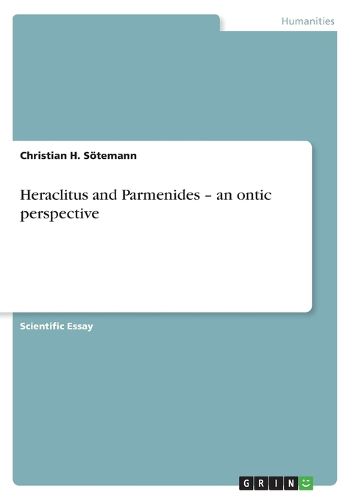Readings Newsletter
Become a Readings Member to make your shopping experience even easier.
Sign in or sign up for free!
You’re not far away from qualifying for FREE standard shipping within Australia
You’ve qualified for FREE standard shipping within Australia
The cart is loading…






Scientific Essay from the year 2008 in the subject Philosophy - General Essays, Eras, 15 entries in the bibliography, language: English, abstract: The article investigates fragments of the two Presocratic philosophers Heraclitus and Parmenides, which are frequently seen as indicating two drastically different views of the world - the former often being summarized as Everything flows, the latter as Everything rests. The perspective chosen here is a descriptive one focussing on the ontic aspect, i.e. the level of mere being there, of presence. It is discussed how an ontic interpretation of the aforementioned Presocratic fragments allow at least a partial integration of the seemingly diametrically opposed philosophies, namely in maintaining that with all the doubtlessly occurring change in the phenomenal world, change does not imply objects turning into nothingness, but rather into different being. Thus, change of state and development is acknowledged on the one hand, as well as the persistence of being on the other hand. Several references to 20th Century philosophy serve to underline the interpretation given here.
$9.00 standard shipping within Australia
FREE standard shipping within Australia for orders over $100.00
Express & International shipping calculated at checkout
Scientific Essay from the year 2008 in the subject Philosophy - General Essays, Eras, 15 entries in the bibliography, language: English, abstract: The article investigates fragments of the two Presocratic philosophers Heraclitus and Parmenides, which are frequently seen as indicating two drastically different views of the world - the former often being summarized as Everything flows, the latter as Everything rests. The perspective chosen here is a descriptive one focussing on the ontic aspect, i.e. the level of mere being there, of presence. It is discussed how an ontic interpretation of the aforementioned Presocratic fragments allow at least a partial integration of the seemingly diametrically opposed philosophies, namely in maintaining that with all the doubtlessly occurring change in the phenomenal world, change does not imply objects turning into nothingness, but rather into different being. Thus, change of state and development is acknowledged on the one hand, as well as the persistence of being on the other hand. Several references to 20th Century philosophy serve to underline the interpretation given here.